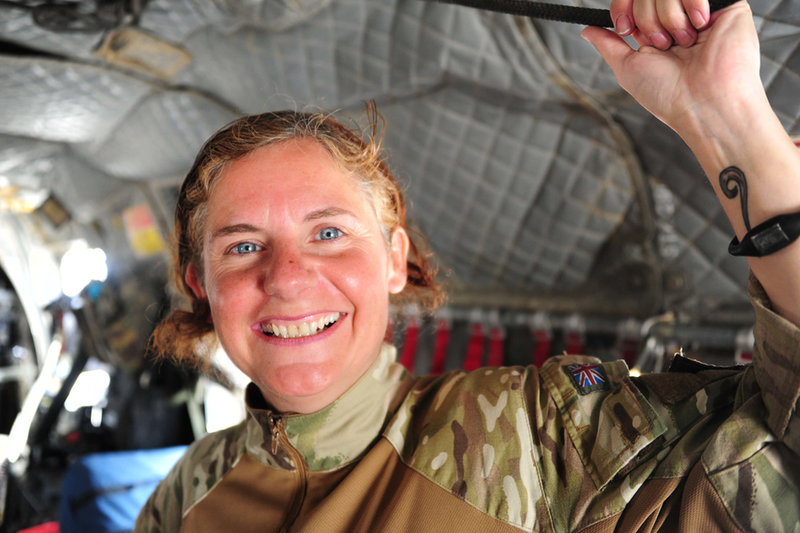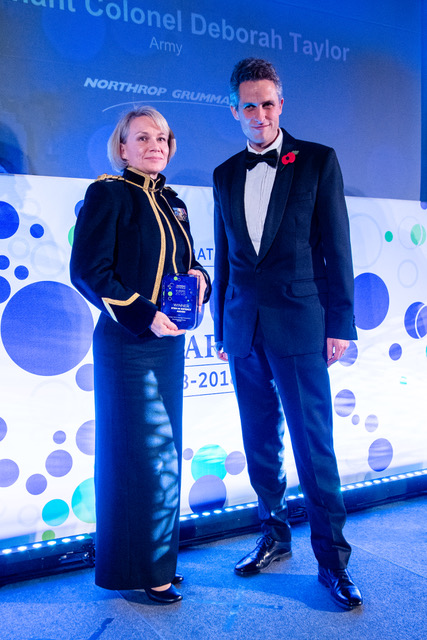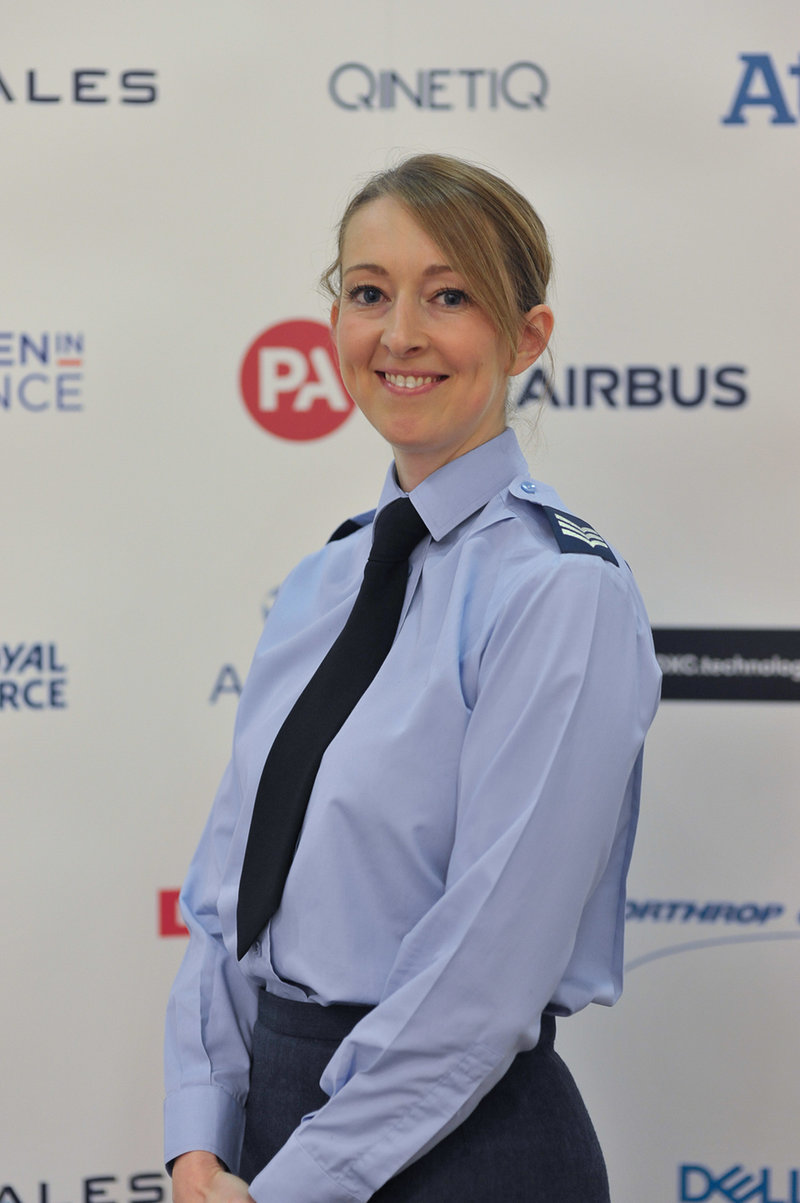Event REPORT
Military stars shine at Women in Defence Awards 2018
The third annual Women in Defence UK Awards, in association with innovation and transformation consultancy PA Consulting, took place on 6 November 2018 to celebrate the achievements of women across the sector. The awards’ founder, category winners and nominees talked to Berenice Baker about their experiences and the importance of celebrating the achievements of women in a field where they are still underrepresented.
Woman of the Year award winner Michelle Partington on duty
The Women in Defence UK Awards 2018, in association with innovation and transformation consultancy PA Consulting, fittingly fell in the year when all British Armed Forces roles became open to women and marked 100 years since the end of WWI and British women winning the right to vote. The links to history were emphasised by the 6 November 2018 event taking place in the Imperial War Museum beneath the wings of a WWII Spitfire, with the Secretary of State for Defence Gavin Williamson announcing the winners.
Each of the 10 categories and the overall Woman of the Year award was sponsored by a defence supplier or a branch of the armed service. There were over 300 nominations received from across the defence community including the Armed Forces, MOD Civil Service, GCHQ, MI5 and SIS, defence industry, the defence third sector and Houses of Parliament Security.
Berenice Baker spoke to the event’s organisers, nominees and winners about the awards as well as their experience working in the defence industry. In addition to this round-up, we’ll also be publishing the individual interviews in future editions of GDT, so keep an eye out for them.
Angela Owen, founder of Women in Defence:

Women in Defence founder Angela Owens
We’ve gone from under 120 people attending the first awards in 2016 to 270 this year and it’s just incredible. We’ve introduced two new categories and widened the scope of nominations to include women who work in defence of the nation.
Part of our vision is to encourage women at all levels to join defence; we want to get the message out that you can have a tremendous career in defence, whether it’s in the armed forces, the defence industry or working in the intelligence community. There is a lot of satisfying and challenging work you can do as women.
Celebrating the success of women in defence gives women confidence in themselves; we reassure them that they are valued and it gives them the confidence to say, hey look, here I am and I’m a woman. I don’t have to be a pseudo-man to get on, which was the case in the past.
Air Marshall Sean Reynolds, who was Air Member for (Personnel) for the Royal Air Force, said to women considering a career in the military: “Join. And then stay.” My message would be: “Don’t rule it out. Have a look at it.”
Michelle Partington, former RAF, winner of the Woman of the Year award:

Woman of the Year award winner Michelle Partington
I was very blessed to be the first female to go out with the RAF Regiment as a paramedic. It took a lot to get me out there; I had to prove that I could do it and people making decisions had been taught that a woman shouldn’t be able to do this job.
Anybody can do the job if their head and heart are in it and they have the capacity. It doesn’t matter what you’ve got or not got between your legs, it’s just a matter of believing in yourself. You don’t have to do it on your own; there are other women that can help you move forward as mentors.
I left the RAF with a diagnosis of PTSD and set up a mental health foundation called Behind The Mask, which provides free online counselling and peer support to others battling with mental illness.
My military career was my dream career, which then turned into my nightmare, and has gone full circle and is back in a good place again. It completed itself for me.
Lieutenant Colonel Deborah Taylor, British Army, winner of STEM in Defence Award for masterminding the first STEM Careers Showcase for secondary-school aged girls at the Royal Military Academy Sandhurst:

STEM Defence Award winner Lieutenant Colonel Deborah Taylor
Part of my job at Sandhurst was to create celebrations around Army Women 100 in 2017. We came up with the idea of a workshop about the breadth of STEM careers so we invited about 40 industry partners, professional bodies, and role models in STEM subjects, who came to talk to the girls about their journey.
We saw the importance of doing female-only events, but we understand that diversity is a journey for everyone. So next year we’re going to do a two-day event, and the first will be female-only, and the second day will be the co-educational event. We’re not saying to anyone we’re just doing this event for girls.
STEM in defence offers broadness of opportunity. You can be anything you want to be, and these days all careers in the army have a STEM twist to them; everything from the medical services through ammunition technicians through to the tank driver have had some element of technical or science-based project requirement.
Some of the winners at the Women in Defence Awards 2018
Corporal Karen Jones, RAF, winner of the Outstanding Contribution Award for her role as an image analyst where her work has tangibly increased Defence Intelligence’s ability to defend the nation:

Outstanding Contribution Award winnerCorporal Karen Jones
I work at RAF Wyton on a section called Force Action Targeting. The work that won me the award came off the back of a strange year for me; I spent a year on maternity leave and was raising a child by myself, so I wasn’t sure I would fit back in to that military environment.
My new boss said, "I have this thing that’s been hanging over my head, would you like to take it over for me? Don’t get it wrong, off you go!" I did one draft, gave it to my boss and everybody else that needed to see it and now it forms part of policy and doctrine for what we do.
It’s really important that these awards are out there and have been able to identify and recognise a minority; I heard a stat that females were represented by 4% across defence.
My message to girls and young women considering a career with the military is don’t be put off by the stereotypes; do what you enjoy.
Professor Petra Oyston, Defence Science Technology Laboratory, winner of the Innovation Award for her work in developing synthetic biology techniques:

Innovation Award Winner Petrya Oyston
I needed a challenging problem to convince other people outside biology that this is a valid approach, and I thought that if they think of biology as producing stuff that’s soft, wet, squishy and pink, then armour is the opposite of that.
Using [genetically-modified E. coli as a toughening mechanism] could produce materials that are lightweight but strong, and they have a massive application beyond armour for things like aeronautical and automotive industries. It’s not just personal armour, it’s also vehicles – tanks are covered in the stuff. And you have to protect sensors, which are doing quite fancy stuff and are quite sensitive themselves, so you have to put something strong, lightweight but transparent in front of them.
I look at what I do here and nothing compares to it the variety of what we do, the people we get to meet, the travel – you get to go to amazing bits of the world and talk to the most amazing, intelligent people, the most gifted scientists in the world. Who wouldn’t want to do that for a living?
Captain Sharon Malkin, Royal Navy, Innovation Award finalist for excellence in innovation that has multiplied the effect of the UK defence mission:

Innovation Award Finalist Captain Sharon Malkin. Image courtesy of Royal Navy
I was put into a new team to look at how we could create a better culture of innovation in the navy, inspire and champion innovation, and link in with the forces and support the defence innovation agenda. When I left we had something like 56 projects on the books, ranging from £600 to £250,000.
There was a lot of the human capability element. Diversity of thought was a fundamental strand of the Discovery, Assessment and Rapid Exploitation (DARE) team that we set up, and we would go round challenging people: I dare you to do something differently; I dare you to think differently.
Role-modelling in different sectors of defence shows there are women doing a complete variety of roles, particularly for the navy, because women only went to sea in the 1990s. It’s taken two decades to grow those more senior officers to get to that point and it just takes time for the younger ones to look up and say, I aspire to be that person or do what they’re doing.